2019_2020学年牛津译林版选修7Unit1Livingwithtechnology1.2知识点课件(30张ppt)
文档属性
| 名称 | 2019_2020学年牛津译林版选修7Unit1Livingwithtechnology1.2知识点课件(30张ppt) |
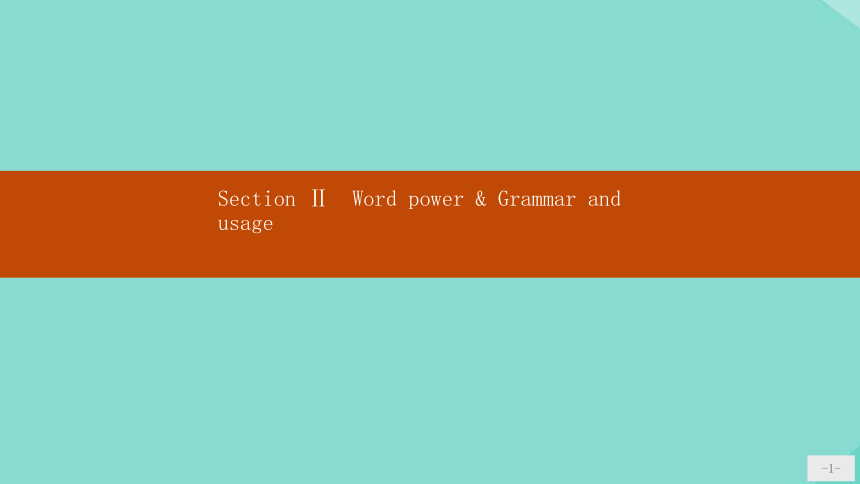
|
|
| 格式 | zip | ||
| 文件大小 | 273.7KB | ||
| 资源类型 | 教案 | ||
| 版本资源 | 牛津译林版 | ||
| 科目 | 英语 | ||
| 更新时间 | 2019-08-25 00:00:00 | ||
图片预览

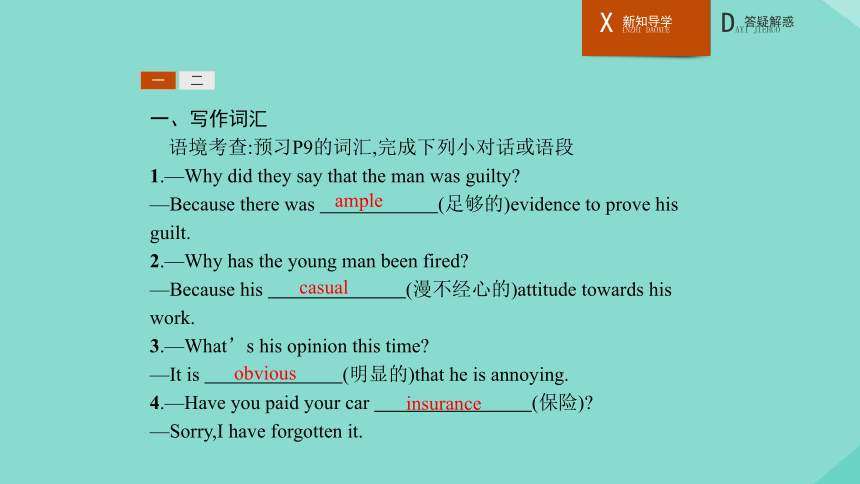
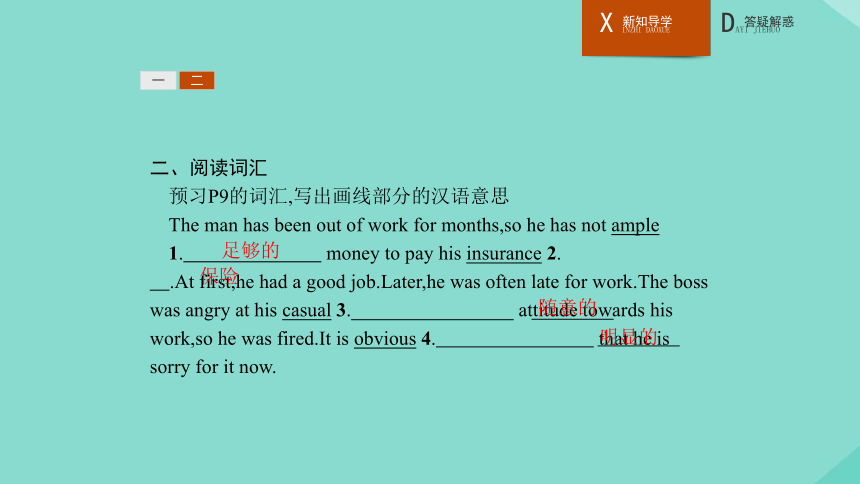
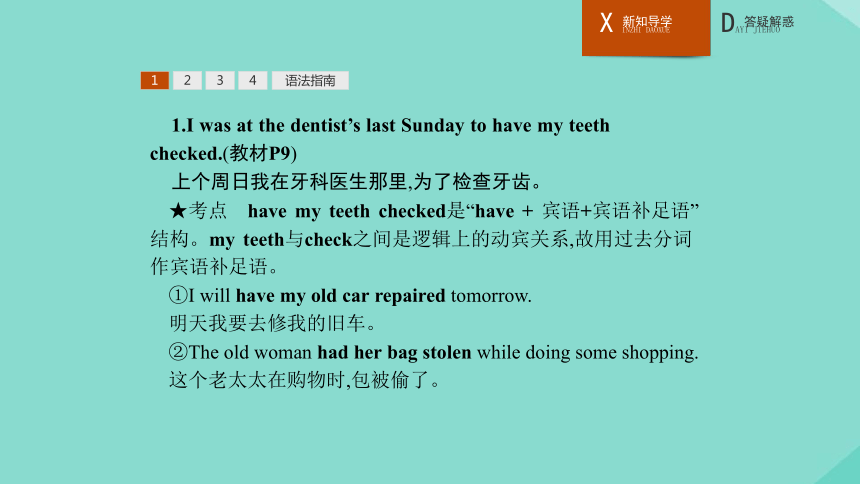
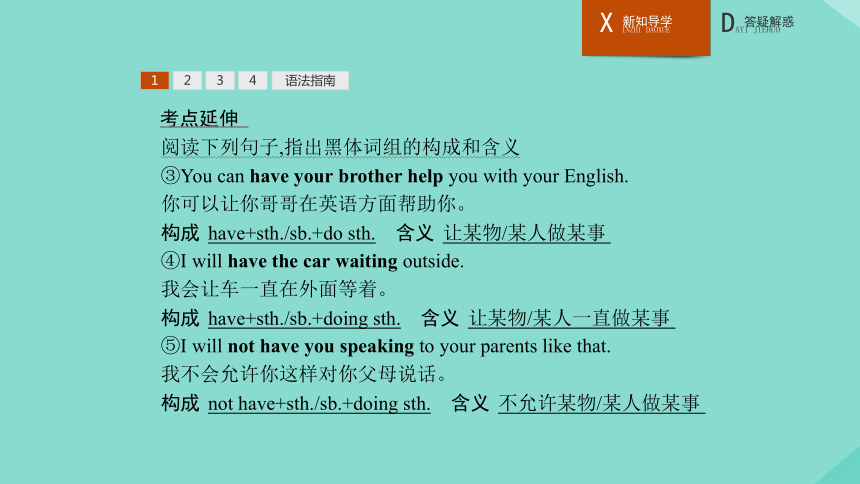

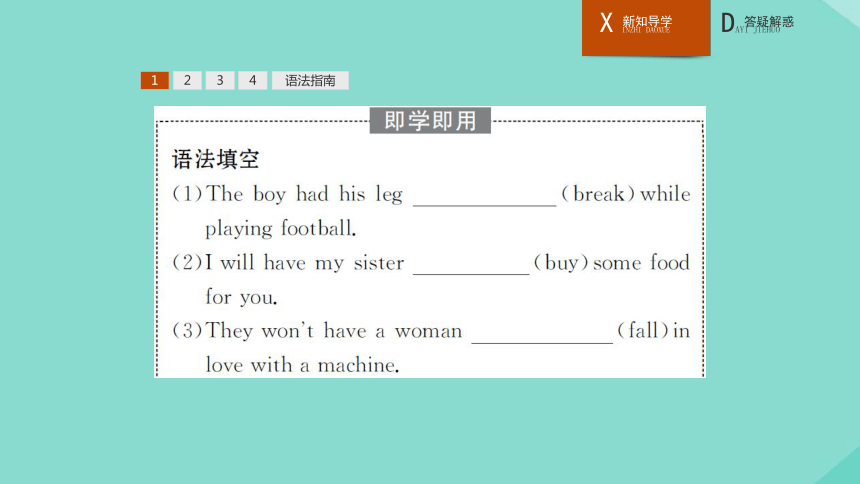
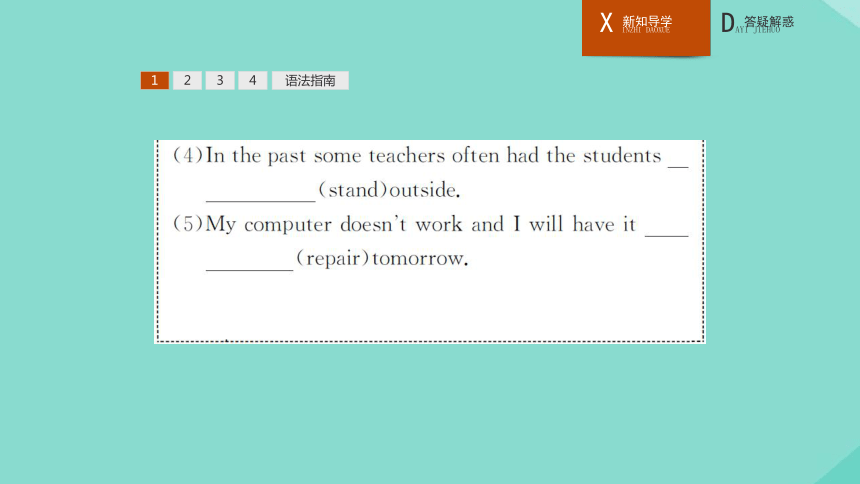
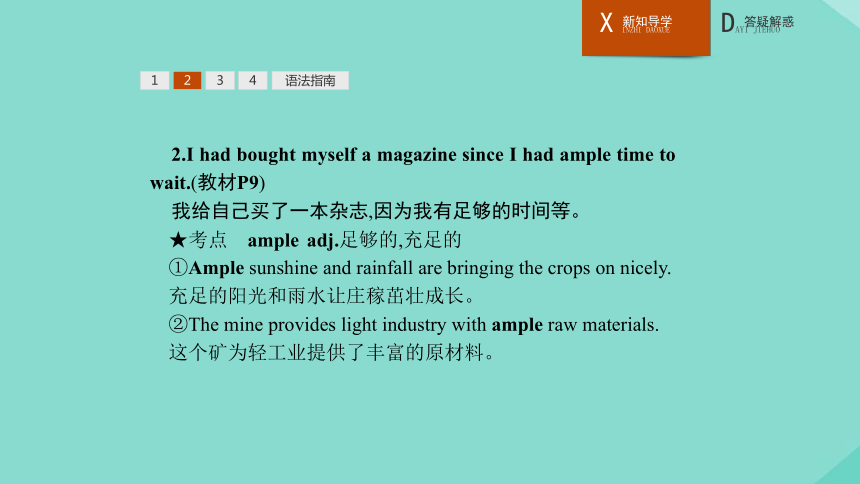


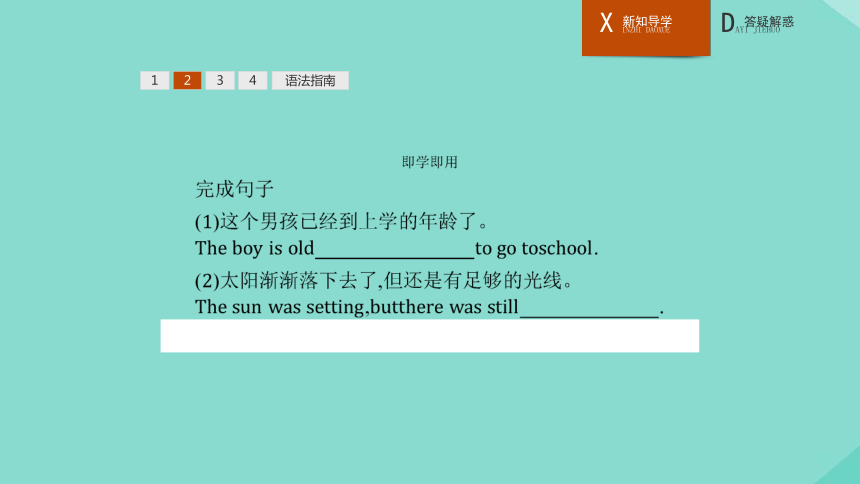
文档简介
(共30张PPT)
Section Ⅱ Word power & Grammar and usage
一
二
一、写作词汇
语境考查:预习P9的词汇,完成下列小对话或语段
1.—Why did they say that the man was guilty?
—Because there was (足够的)evidence to prove his guilt.?
2.—Why has the young man been fired?
—Because his (漫不经心的)attitude towards his work.?
3.—What’s his opinion this time?
—It is (明显的)that he is annoying.?
4.—Have you paid your car (保险)??
—Sorry,I have forgotten it.
ample
casual
obvious
insurance
一
二
二、阅读词汇
预习P9的词汇,写出画线部分的汉语意思
The man has been out of work for months,so he has not ample
1. money to pay his insurance 2. .At first,he had a good job.Later,he was often late for work.The boss was angry at his casual 3. attitude towards his work,so he was fired.It is obvious 4. that he is sorry for it now.?
足够的
保险
随意的
明显的
1
2
3
4
语法指南
1.I was at the dentist’s last Sunday to have my teeth checked.(教材P9)
上个周日我在牙科医生那里,为了检查牙齿。
★考点 have my teeth checked是“have + 宾语+宾语补足语”结构。my teeth与check之间是逻辑上的动宾关系,故用过去分词作宾语补足语。
①I will have my old car repaired tomorrow.
明天我要去修我的旧车。
②The old woman had her bag stolen while doing some shopping.
这个老太太在购物时,包被偷了。
1
2
3
4
语法指南
考点延伸?
阅读下列句子,指出黑体词组的构成和含义
③You can have your brother help you with your English.
你可以让你哥哥在英语方面帮助你。
构成 have+sth./sb.+do sth. 含义 让某物/某人做某事?
④I will have the car waiting outside.
我会让车一直在外面等着。
构成 have+sth./sb.+doing sth. 含义 让某物/某人一直做某事?
⑤I will not have you speaking to your parents like that.
我不会允许你这样对你父母说话。
构成 not have+sth./sb.+doing sth. 含义 不允许某物/某人做某事?
1
2
3
4
语法指南
have sth./sb.do sth.让某物/某人做某事
have sth./sb.doing sth.让某物/某人一直做某事
have sth./sb.done 使某物/某人被……
not have sth./sb.doing sth.不允许某物/某人做某事
1
2
3
4
语法指南
1
2
3
4
语法指南
1
2
3
4
语法指南
2.I had bought myself a magazine since I had ample time to wait.(教材P9)
我给自己买了一本杂志,因为我有足够的时间等。
★考点 ample adj.足够的,充足的
①Ample sunshine and rainfall are bringing the crops on nicely.
充足的阳光和雨水让庄稼茁壮成长。
②The mine provides light industry with ample raw materials.
这个矿为轻工业提供了丰富的原材料。
1
2
3
4
语法指南
考点延伸?
阅读下列句子,指出黑体词的词性及含义
③Do you have enough time to finish the paper?
你有足够的时间来完成这篇论文吗?
词性 形容词 含义 足够的
④I am old enough to deal with my own affairs.
我已经长大了,能够处理自己的事情了。
词性 副词 含义 足够地
1
2
3
4
语法指南
ample adj.足够的
enough 修饰名词时,放在名词前面;修饰形容词或副词时,需要后置。
1
2
3
4
语法指南
1
2
3
4
语法指南
3.We had a casual conversation in the waiting room.(教材P9)
我们在候诊室里闲谈。
★考点 casual adj.非正式的,随便的,漫不经心的,不经意的
①Jane felt more comfortable in casual clothes.
简穿着便装更舒服。
②He tried to sound casual,but I knew he was worried.
他试图显得不在乎,但我知道他很心急。
考点延伸?
阅读下列句子,指出黑体词的词性及含义
③She glanced casually through a magazine as she waited.
她一边等一边漫不经心地翻看杂志。
词性 副词 含义 漫不经心地
1
2
3
4
语法指南
casual adj.漫不经心的
casually adv.漫不经心地
1
2
3
4
语法指南
1
2
3
4
语法指南
4.It was obvious that he was suffering great pain when he talked.(教材P9)
显而易见的是,他在交谈的时候遭受了很大的痛苦。
★考点 obvious adj.显然的;显而易见的
①Her unhappiness was obvious.
她的不悦是显而易见的。
②It is obvious that she is very clever.
很明显,她很聪明。
1
2
3
4
语法指南
考点延伸?
阅读下列句子,指出黑体词的词性或含义
③Obviously,the manager knew nothing about the accident.
显然,这个经理对这次事故一无所知。
词性 副词 含义 明显地
obvious adj.明显的
obviously adv.显然地
1
2
3
4
语法指南
(2) (obvious),the woman doesn’t want to leave the village.?
答案(1)that (2)Obviously
1
2
3
4
语法指南
及物动词和不及物动词
一、概述
从是否需要宾语来看,实义动词可分为及物动词和不及物动词两类。
(1)及物动词后面必须跟动作的对象(即宾语),名词、代词或者相当于名词的词都可以作宾语。及物动词用vt.表示。
(2)不及物动词后面不能直接跟宾语,要跟宾语就必须先添加介词,但一旦加了介词后其后就必须跟宾语。不及物动词用vi.表示。
(3)有些动词既是及物动词,又是不及物动词,因此可跟宾语也可不跟宾语。
1
2
3
4
语法指南
二、用法
及物动词和不及物动词的具体用法是:
(1)及物动词:后面必须跟宾语意义才完整的实义动词叫做及物动词(Transitive Verb)。
I believe that the committee will consider our suggestion.
我相信这个委员会将会考虑我们的建议。
“How long can I keep the book?”Harry asked.
哈里问:“这本书我可以借用多久?”
Crude oil contains many useful substances.
原油含有许多有用的物质。
The driver failed to see the other car in time.
司机没能及时看见另一辆车。
1
2
3
4
语法指南
注意:a)有些及物动词可以带两个宾语,往往一个指人,一个指物,指人的叫间接宾语,指物的叫直接宾语。
He gave me some ink.他给了我一些墨水。
英语中有些动词可以带两个宾语,这些动词大多具有“给予”的含义,如“He lent me a book.”中,动词lent 后面带有表示动作结果的直接宾语(a book)和表示动作目标的间接宾语(me)。间接宾语在大多数情况下置于直接宾语之前,如果间接宾语在后,间接宾语前必须加“to”(表示动作对什么人而做)或“for”(表示动作为什么人而做),因此,这句话也可以改为:He lent a book to me.
英语中常带双宾语的动词有:send,pass,buy,make,pay,hand,sell,find,do,see 等。
He sent me a card.→ He sent a card to me.
他送给我一张卡片。
1
2
3
4
语法指南
He passed me the salt.→ He passed the salt to me.
他把盐递给了我。
She bought me a tie.→ She bought a tie for me.
她买了一条领带给我。
She made me a cake.→ She made a cake for me.
她给我做了一个蛋糕。
He paid the waiter some money.→He paid some money to the waiter.
他付给服务员一些钱。
He handed me the prize.→ He handed the prize to me.
他把奖品递给了我。
He sold me all his books.→ He sold all his books to me.
他把所有的书都卖给了我。
1
2
3
4
语法指南
b)有些及物动词的宾语后面还需要有一个补足语,意思才完整,宾语和它的补足语构成复合宾语。
We make him monitor.我们选他当班长。
常跟复合宾语的动词或短语有:call,name,make,think,find,leave,keep,choose,elect(选举),define(定义),regard(认为),see,recognize(认出),treat,take,consider(考虑),look up,refer to(提到),accept(接受),acknowledge(承认),describe,represent(表现出),declare(宣称),employ(雇用),use,show,organize,express(表达)等。
1
2
3
4
语法指南
(2)不及物动词:本身意义完整,后面可不跟宾语的实义动词叫做不及物动词(Intransitive Verb)。
Birds fly.
鸟会飞。
It happened in June 1932.
这件事发生于1932年6月。
My watch stopped.
我的表停了。
She spoke at the meeting yesterday evening.
她在昨天晚上的会上发了言。
1
2
3
4
语法指南
(3)兼作及物动词和不及物动词。英语里有不少实义动词可以兼作及物动词和不及物动词。这样的动词又有两种不同的情况:
a)兼作及物动词和不及物动词时,意思不变。试比较:
She began working as a librarian after she left school.
她毕业后就开始当图书馆管理员了。(begin作及物动词)
Shall I begin at once?我可以立刻开始吗?(begin作不及物动词)
When did they leave Chicago?他们是什么时候离开芝加哥的?(leave 作及物动词)
They left last week.他们是上周离开的。(leave 作不及物动词)
b)兼作及物动词和不及物动词时,有时意义不尽相同。
Wash your hands before meals.
饭前要洗手。
Does this cloth wash well?
这布经得起洗吗?
1
2
3
4
语法指南
(4)与汉语的比较。有时英语中动词的及物和不及物的用法与汉语中的用法不一样,请注意下列两种情况:
a)有的动词在英语里只能用作不及物动词,而汉语中则可用作及物动词,如:arrive“到达”,listen“听”,agree“同意”,英语里这些动词后面常接介词。
We arrived at the railway station at noon.
我们中午到达了火车站。(at不能省去)(比较:We reached the railway station at noon.)
1
2
3
4
语法指南
Everybody listened to the lecture with great interest.
每个人都很有兴趣地听演讲。(to不可省去)(比较:We all heard the lecture with great interest.)
Do they agree to the plan?他们同意这个计划吗?(to不可省去)
b)有的动词在英语里能用作及物动词,而在汉语里则不能用作及物动词,如:serve“为……服务”。
Our children are taught to serve the people whole-heartedly.
我们的孩子被教导要全心全意为人民服务。
1
2
3
4
语法指南
(5)语态
及物动词的语态:大多数的及物动词有主动语态和被动语态两种语态,但有些及物动词不能用于被动语态。例如:
a)当句子的谓语是表示“拥有”“容纳”“缺少”等概念的及物动词时。
The millionaire possesses great wealth.
这位百万富翁拥有大量的财富。
The newly-constructed reservoir holds a lot of water.
新建的水库蓄水量很大。
b)当句子的谓语是表示“适合”的及物动词,如suit,fit等时。
The blue skirt suits Mary very well.
这条蓝裙子玛丽穿上去很合适。
We should fit our deeds to our words.
我们应该言行一致。
1
2
3
4
语法指南
c)当句子的谓语是表示“相互作用”的及物动词,如:equal,mean,resemble等时。
No one equals him in intelligence.
他的智力是无与伦比的。
The two boys resemble each other in appearance.
这两个男孩长得很像。
主动表被动的不及物动词:英语中有些动词在形式上是主动的,含义上却是被动的,但是这些动词这样用时又不是不及物动词。常见的这类动词有:sell,wash,cook,wear,write,look,open,shut,translate,read,last,cut,bend,teach等。其用主动形式表被动,强调的是主语本身所具有的某种内在的品质。
1
2
3
4
语法指南
This novel doesn’t sell well.
这本小说销售不畅。(是小说本身的原因)
The door won’t lock.
门锁不上。(门本身有毛病)
These clothes wash well.
这种衣服好洗。(布料的原因)
Section Ⅱ Word power & Grammar and usage
一
二
一、写作词汇
语境考查:预习P9的词汇,完成下列小对话或语段
1.—Why did they say that the man was guilty?
—Because there was (足够的)evidence to prove his guilt.?
2.—Why has the young man been fired?
—Because his (漫不经心的)attitude towards his work.?
3.—What’s his opinion this time?
—It is (明显的)that he is annoying.?
4.—Have you paid your car (保险)??
—Sorry,I have forgotten it.
ample
casual
obvious
insurance
一
二
二、阅读词汇
预习P9的词汇,写出画线部分的汉语意思
The man has been out of work for months,so he has not ample
1. money to pay his insurance 2. .At first,he had a good job.Later,he was often late for work.The boss was angry at his casual 3. attitude towards his work,so he was fired.It is obvious 4. that he is sorry for it now.?
足够的
保险
随意的
明显的
1
2
3
4
语法指南
1.I was at the dentist’s last Sunday to have my teeth checked.(教材P9)
上个周日我在牙科医生那里,为了检查牙齿。
★考点 have my teeth checked是“have + 宾语+宾语补足语”结构。my teeth与check之间是逻辑上的动宾关系,故用过去分词作宾语补足语。
①I will have my old car repaired tomorrow.
明天我要去修我的旧车。
②The old woman had her bag stolen while doing some shopping.
这个老太太在购物时,包被偷了。
1
2
3
4
语法指南
考点延伸?
阅读下列句子,指出黑体词组的构成和含义
③You can have your brother help you with your English.
你可以让你哥哥在英语方面帮助你。
构成 have+sth./sb.+do sth. 含义 让某物/某人做某事?
④I will have the car waiting outside.
我会让车一直在外面等着。
构成 have+sth./sb.+doing sth. 含义 让某物/某人一直做某事?
⑤I will not have you speaking to your parents like that.
我不会允许你这样对你父母说话。
构成 not have+sth./sb.+doing sth. 含义 不允许某物/某人做某事?
1
2
3
4
语法指南
have sth./sb.do sth.让某物/某人做某事
have sth./sb.doing sth.让某物/某人一直做某事
have sth./sb.done 使某物/某人被……
not have sth./sb.doing sth.不允许某物/某人做某事
1
2
3
4
语法指南
1
2
3
4
语法指南
1
2
3
4
语法指南
2.I had bought myself a magazine since I had ample time to wait.(教材P9)
我给自己买了一本杂志,因为我有足够的时间等。
★考点 ample adj.足够的,充足的
①Ample sunshine and rainfall are bringing the crops on nicely.
充足的阳光和雨水让庄稼茁壮成长。
②The mine provides light industry with ample raw materials.
这个矿为轻工业提供了丰富的原材料。
1
2
3
4
语法指南
考点延伸?
阅读下列句子,指出黑体词的词性及含义
③Do you have enough time to finish the paper?
你有足够的时间来完成这篇论文吗?
词性 形容词 含义 足够的
④I am old enough to deal with my own affairs.
我已经长大了,能够处理自己的事情了。
词性 副词 含义 足够地
1
2
3
4
语法指南
ample adj.足够的
enough 修饰名词时,放在名词前面;修饰形容词或副词时,需要后置。
1
2
3
4
语法指南
1
2
3
4
语法指南
3.We had a casual conversation in the waiting room.(教材P9)
我们在候诊室里闲谈。
★考点 casual adj.非正式的,随便的,漫不经心的,不经意的
①Jane felt more comfortable in casual clothes.
简穿着便装更舒服。
②He tried to sound casual,but I knew he was worried.
他试图显得不在乎,但我知道他很心急。
考点延伸?
阅读下列句子,指出黑体词的词性及含义
③She glanced casually through a magazine as she waited.
她一边等一边漫不经心地翻看杂志。
词性 副词 含义 漫不经心地
1
2
3
4
语法指南
casual adj.漫不经心的
casually adv.漫不经心地
1
2
3
4
语法指南
1
2
3
4
语法指南
4.It was obvious that he was suffering great pain when he talked.(教材P9)
显而易见的是,他在交谈的时候遭受了很大的痛苦。
★考点 obvious adj.显然的;显而易见的
①Her unhappiness was obvious.
她的不悦是显而易见的。
②It is obvious that she is very clever.
很明显,她很聪明。
1
2
3
4
语法指南
考点延伸?
阅读下列句子,指出黑体词的词性或含义
③Obviously,the manager knew nothing about the accident.
显然,这个经理对这次事故一无所知。
词性 副词 含义 明显地
obvious adj.明显的
obviously adv.显然地
1
2
3
4
语法指南
(2) (obvious),the woman doesn’t want to leave the village.?
答案(1)that (2)Obviously
1
2
3
4
语法指南
及物动词和不及物动词
一、概述
从是否需要宾语来看,实义动词可分为及物动词和不及物动词两类。
(1)及物动词后面必须跟动作的对象(即宾语),名词、代词或者相当于名词的词都可以作宾语。及物动词用vt.表示。
(2)不及物动词后面不能直接跟宾语,要跟宾语就必须先添加介词,但一旦加了介词后其后就必须跟宾语。不及物动词用vi.表示。
(3)有些动词既是及物动词,又是不及物动词,因此可跟宾语也可不跟宾语。
1
2
3
4
语法指南
二、用法
及物动词和不及物动词的具体用法是:
(1)及物动词:后面必须跟宾语意义才完整的实义动词叫做及物动词(Transitive Verb)。
I believe that the committee will consider our suggestion.
我相信这个委员会将会考虑我们的建议。
“How long can I keep the book?”Harry asked.
哈里问:“这本书我可以借用多久?”
Crude oil contains many useful substances.
原油含有许多有用的物质。
The driver failed to see the other car in time.
司机没能及时看见另一辆车。
1
2
3
4
语法指南
注意:a)有些及物动词可以带两个宾语,往往一个指人,一个指物,指人的叫间接宾语,指物的叫直接宾语。
He gave me some ink.他给了我一些墨水。
英语中有些动词可以带两个宾语,这些动词大多具有“给予”的含义,如“He lent me a book.”中,动词lent 后面带有表示动作结果的直接宾语(a book)和表示动作目标的间接宾语(me)。间接宾语在大多数情况下置于直接宾语之前,如果间接宾语在后,间接宾语前必须加“to”(表示动作对什么人而做)或“for”(表示动作为什么人而做),因此,这句话也可以改为:He lent a book to me.
英语中常带双宾语的动词有:send,pass,buy,make,pay,hand,sell,find,do,see 等。
He sent me a card.→ He sent a card to me.
他送给我一张卡片。
1
2
3
4
语法指南
He passed me the salt.→ He passed the salt to me.
他把盐递给了我。
She bought me a tie.→ She bought a tie for me.
她买了一条领带给我。
She made me a cake.→ She made a cake for me.
她给我做了一个蛋糕。
He paid the waiter some money.→He paid some money to the waiter.
他付给服务员一些钱。
He handed me the prize.→ He handed the prize to me.
他把奖品递给了我。
He sold me all his books.→ He sold all his books to me.
他把所有的书都卖给了我。
1
2
3
4
语法指南
b)有些及物动词的宾语后面还需要有一个补足语,意思才完整,宾语和它的补足语构成复合宾语。
We make him monitor.我们选他当班长。
常跟复合宾语的动词或短语有:call,name,make,think,find,leave,keep,choose,elect(选举),define(定义),regard(认为),see,recognize(认出),treat,take,consider(考虑),look up,refer to(提到),accept(接受),acknowledge(承认),describe,represent(表现出),declare(宣称),employ(雇用),use,show,organize,express(表达)等。
1
2
3
4
语法指南
(2)不及物动词:本身意义完整,后面可不跟宾语的实义动词叫做不及物动词(Intransitive Verb)。
Birds fly.
鸟会飞。
It happened in June 1932.
这件事发生于1932年6月。
My watch stopped.
我的表停了。
She spoke at the meeting yesterday evening.
她在昨天晚上的会上发了言。
1
2
3
4
语法指南
(3)兼作及物动词和不及物动词。英语里有不少实义动词可以兼作及物动词和不及物动词。这样的动词又有两种不同的情况:
a)兼作及物动词和不及物动词时,意思不变。试比较:
She began working as a librarian after she left school.
她毕业后就开始当图书馆管理员了。(begin作及物动词)
Shall I begin at once?我可以立刻开始吗?(begin作不及物动词)
When did they leave Chicago?他们是什么时候离开芝加哥的?(leave 作及物动词)
They left last week.他们是上周离开的。(leave 作不及物动词)
b)兼作及物动词和不及物动词时,有时意义不尽相同。
Wash your hands before meals.
饭前要洗手。
Does this cloth wash well?
这布经得起洗吗?
1
2
3
4
语法指南
(4)与汉语的比较。有时英语中动词的及物和不及物的用法与汉语中的用法不一样,请注意下列两种情况:
a)有的动词在英语里只能用作不及物动词,而汉语中则可用作及物动词,如:arrive“到达”,listen“听”,agree“同意”,英语里这些动词后面常接介词。
We arrived at the railway station at noon.
我们中午到达了火车站。(at不能省去)(比较:We reached the railway station at noon.)
1
2
3
4
语法指南
Everybody listened to the lecture with great interest.
每个人都很有兴趣地听演讲。(to不可省去)(比较:We all heard the lecture with great interest.)
Do they agree to the plan?他们同意这个计划吗?(to不可省去)
b)有的动词在英语里能用作及物动词,而在汉语里则不能用作及物动词,如:serve“为……服务”。
Our children are taught to serve the people whole-heartedly.
我们的孩子被教导要全心全意为人民服务。
1
2
3
4
语法指南
(5)语态
及物动词的语态:大多数的及物动词有主动语态和被动语态两种语态,但有些及物动词不能用于被动语态。例如:
a)当句子的谓语是表示“拥有”“容纳”“缺少”等概念的及物动词时。
The millionaire possesses great wealth.
这位百万富翁拥有大量的财富。
The newly-constructed reservoir holds a lot of water.
新建的水库蓄水量很大。
b)当句子的谓语是表示“适合”的及物动词,如suit,fit等时。
The blue skirt suits Mary very well.
这条蓝裙子玛丽穿上去很合适。
We should fit our deeds to our words.
我们应该言行一致。
1
2
3
4
语法指南
c)当句子的谓语是表示“相互作用”的及物动词,如:equal,mean,resemble等时。
No one equals him in intelligence.
他的智力是无与伦比的。
The two boys resemble each other in appearance.
这两个男孩长得很像。
主动表被动的不及物动词:英语中有些动词在形式上是主动的,含义上却是被动的,但是这些动词这样用时又不是不及物动词。常见的这类动词有:sell,wash,cook,wear,write,look,open,shut,translate,read,last,cut,bend,teach等。其用主动形式表被动,强调的是主语本身所具有的某种内在的品质。
1
2
3
4
语法指南
This novel doesn’t sell well.
这本小说销售不畅。(是小说本身的原因)
The door won’t lock.
门锁不上。(门本身有毛病)
These clothes wash well.
这种衣服好洗。(布料的原因)
